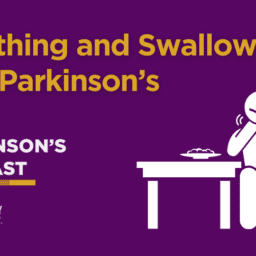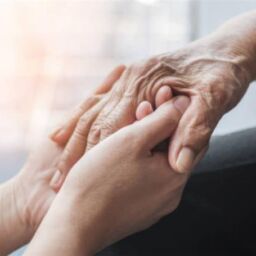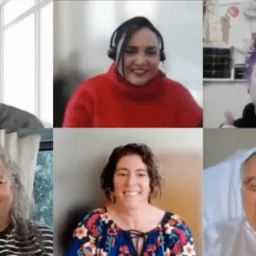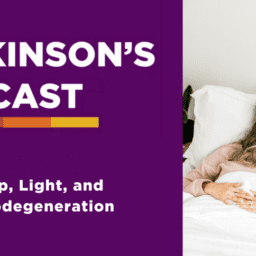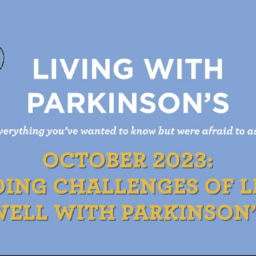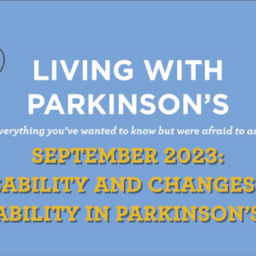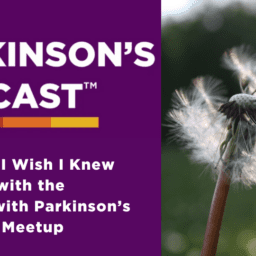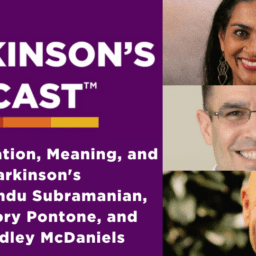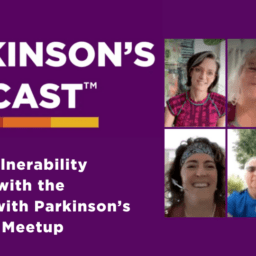[NOTE: Have a topic you’d like our YOPD Council to discuss in future sessions? We want to hear about it! Let us know what’s top of mind or any questions you’d like to ask panel members by filling out this form.]
During this session, the YOPD Council discusses their experience with non-motor symptoms.
You can listen to the podcast below.
To download the transcript, click here.
Show Notes
- Non-motor symptoms are the symptoms you don’t see in Parkinson’s. Non-motor symptoms vary from person to person and can include but may not be limited to:
- Anxiety
- Apathy
- Breathing
- Cognitive changes
- Constipation
- Nausea
- Dementia
- Depression
- Fatigue
- Hallucinations
- Delusion
- Loss of smell
- Pain
- Skeletal bone health
- Skin changes
- Sleep disorder
- Small handwriting
- Swallowing problems
- Urinary incontinence
- Vertigo
- Dizziness
- Vision changes
- Weight management
- While it is common for people with Parkinson’s to want to hide their non-motor symptoms from their doctors for reasons of self-worth, shame, and feelings of failure, the appearance and progression of non-motor symptoms in Parkinson’s is natural, and it is imperative to discuss them with your doctor to get the treatment and help that’s available
- Non-motor symptoms can be particularly frustrating because they can’t be seen, and therefore friends and family may say, “You don’t look like you have Parkinson’s”
- Recognize that it may take a team of health professionals to address all of your motor symptoms and non-motor symptoms, because as the panelists emphasize, “One physician can’t possibly address them all”
- Non-motor symptoms such as depression and anxiety can be very difficult to deal with, especially when they arise unexpectedly. Council member Karen Frank encourages people to remain flexible when symptoms like this occur and to remember that no matter how difficult it is in the moment, it will pass and is not forever
- Non-motor symptoms may start off as “nuisance symptoms,” as Kevin Kwok says, but they are important to pay attention to because if not treated, they can quickly blossom into something bigger
- There is no one solution for improving mental health symptoms; these symptoms are often managed through a combination of multiple techniques
- Anxiety is a common non-motor symptom and can manifest in many ways, including an unstoppable stream of worrying thoughts or excessive thoughts on one subject. Council members suggest the following techniques to manage anxiety:
- Practice short, guided meditations
- Split the things you are worrying about into two categories: things you can control and things you can’t
- Establish a support system that you can call when you need to break out of an anxiety cycle
- Utilize a visual or auditory cue to interrupt your anxiety cycle – take a picture, listen to music
- Listen to an old-time radio show or podcast to distract your brain
- Pick up an object and mentally observe everything you see and feel in that object
- Depression is another very common non-motor symptom and can look like many things. Depression for you may be not taking a shower for three days, lacking the energy to make meals, or lacking the interest to do anything. Try one of the following techniques if you find yourself experiencing depression:
- Join a mental health support group
- Explore therapy options
- Talk with your care team about treatments
- Watch a video of a comedian
- Keep a “tickler” notebook
- Call a friend
- Struggling with proper sleep is a common concern for people with Parkinson’s. Our Council members experience a wide variety of sleep issues, including only sleeping a few hours per night, experiencing interrupted sleep, sleeping too much, having worsening symptoms during the day because of lack of sleep, not sleeping deeply, and having sleep disturbances as a side effect of taking other Parkinson’s medications. Their advice is to:
- Keep a sleep journal to observe if there are any specific patterns to your sleep issues
- Structure your day and stop using screens a few hours before bedtime every night
- Listen to white noise as you fall asleep
- Listen to ASMR as you fall asleep (You can find white noise and ASMR recordings on Youtube, Spotify, or Apple Podcasts)
“I try to avoid focusing on the individual non-motor symptoms that I am experiencing, but rather try to address areas in my life that are being negatively affected by them and figure out how I can address those.”
-Kevin Kwok
resources and topics discussed
Health Disparities: Parkinson’s and Cultural Context
Parkinson’s Non-Motor Symptoms Resource Page
I Have Parkinson’s and I’m Okay
Why Is It So Hard to Sleep Now That I Have Parkinson’s?
Depression, Anxiety, and Apathy
Want to Be notified for future YOPD Councils?
The YOPD Council meets on the third Thursday of every month and every session is recorded and shared for all to access. Register for the YOPD Council series here, after which you will be invited to join live and be personally notified when a new webinar recording is posted. Interested in catching up on past YOPD Council webinar recordings? You can find all recordings on a variety of subjects on our YOPD Council Youtube playlist, and don’t forget to subscribe to our channel to be notified when new Youtube content becomes available.
Thanks for Listening!
To share your thoughts:
- Leave a note in the comment section below.
- Ask a question by emailing us here.
- Share this show on Facebook.
To help out the show:
- Leave an honest review on iTunes. Your ratings and reviews really help, and we read each one.
- Subscribe on iTunes.
Listen & Subscribe
Apple Podcasts | Stitcher
*The Third Season of the Parkinson’s Podcast is made possible through generous support in honor of Dr. Margaret Hilgartner.



